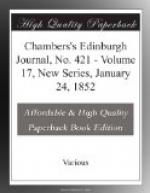Nearly two years passed away, during which, with the exception of Sundays and holidays, every recurring morning brought me the grateful though momentary vision of one or both of the charming sisters. Then came an additional pleasure—I met them both together every day. The younger had commenced practising the same delicate and ingenious craft of embroidery, and the two pursued their industry in company under the same employer. It was amusing to mark the demure assumption of womanhood darkening the brows of the aerial little sprite, as, with all the new-born consequence of responsibility, she walked soberly by her sister’s side, frame in hand, and occasionally revealed to passers-by a brief glimpse of her many-coloured handiwork. They were the very picture of beauty and happiness, and happy beyond question must their innocent lives have been for many pleasant months. But soon the shadows of care began to steal over their hitherto joyous faces, and traces of anxiety, perhaps of tears, to be too plainly visible on their paling cheeks. All at once I missed them in my morning’s walk, and for several days—it might be weeks—saw nothing of them. I was at length startled from my forgetfulness of their very existence by the sudden apparition of both one Monday morning clad in the deepest mourning. I saw the truth at once: the mother, who, I had remarked, was prematurely old and feeble, was gone, and the two orphan children were left to battle it with the world. My conjecture was the truth, as a neighbour of whom I made some inquiries on the subject was not slow to inform me. ‘Ah, sir,’ said the good woman, ’poor Mrs D—— have had a hard time of it, and she born an’ bred a gentlewoman.’
I asked her if the daughters were provided for.
‘Indeed, sir,’ continued my informant, ’I’m afeard not. ’Twas the most unfortnatest thing in the world, sir, poor Mr D——’s dying jest as a’ did. You see, sir, he war a soldier, a fightin’ out in Indy, and his poor wife lef at home wi’ them two blossoms o’ gals. He warn’t what you call a common soldier, sir, but some kind o’ officer like; an’ in some great battle fought seven year agone




